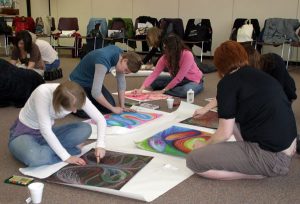Art And Recovery: Opening The Window To The Soul Through Art Therapy
 In treating eating disorders often a multi-disciplinary approach can enhance a person’s chances of recovering.
In treating eating disorders often a multi-disciplinary approach can enhance a person’s chances of recovering.
Besides medical treatment, recovery can also include a combination of nutrition management, psychotherapy, family-based therapy and even art therapy.
Art Therapy Explained
Art therapy is a form of psychotherapy that uses art to help an individual better understand his or her emotions, and that is believed to reflect a person’s experiences, including unresolved emotional issues and conflicts. Art therapy can be practiced in a group, or on an individual basis. This form of therapy uses paint, clay, drawing, sculpture and other forms of creative expression. Art is used as the focus and medium of communication for a patient, with an emphasis on developing and expressing images that come from within.
Through various art mediums, art therapists teach a person to create artwork and to reflect on the process of creation, as well as on the art itself. Art therapists can recognize nonverbal symbols and metaphors that occur in a person’s artwork. Through these symbols and signs new insights are obtained, and a person is able to develop a new self-awareness that can result in discovering better coping mechanisms and tools. Art therapy is a safe, reflective space for a person in recovery where he or she can discover his or herself, explore issues and find answers. There is no special or previous knowledge of art required in order to start art therapy, or for it to be effective.
Eating Disorders and Art Therapy
Michelle Dean, an art therapist that specializes in treating disorders, believes that eating disorders are symbolic voices trying to express underlying issues and needs. Due to the metaphorical nature of art, she argues, it is a highly effective vehicle for tackling the true issues behind an individual’s eating disorder. Dean also explains that although patients who struggle with eating disorders are bright and articulate, they can be vulnerable to using symptoms to express needs, conflict and discomfort. In other words, often times a person will believe that food is the problem, and will neglect the true emotional reason behind his or her disorder.
Furthermore, art therapy can be helpful to an individual as an alternative coping mechanism that a person can resort to when he or she feels overwhelmed. Art therapy can also help a person see problems from a different perspective and allow for creative problem solving. An example of how art therapy is used is when in therapy a person is asked to create an image that represents his or her eating disorder. In this technique, a person is guided to find shapes, colors, and words that describe problems that were unknown to him or her. After a person is done creating his or her vision, he or she must engage in an open discussion and reflect on his or her artwork.
Another interesting application of art therapy is body tracing. In this instance the art therapist guides a person to look and learn about body image distortion. Using full-size drawing paper, a person is asked to draw what he or she thinks he or she looks like. The therapist will then trace the person’s actual body directly on the same piece of paper. Often, a person with an eating disorder will overestimate the size of his or her body. Seeing the difference between what a person feels is his or her estimated size and his or her real size can be very enlightening.
Sources: Healthxchange and Examiner
 Eating Disorder Self Test. Take the EAT-26 self test to see if you might have eating disorder symptoms that might require professional evaluation. All answers are confidential.
Eating Disorder Self Test. Take the EAT-26 self test to see if you might have eating disorder symptoms that might require professional evaluation. All answers are confidential.